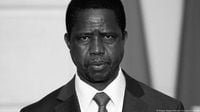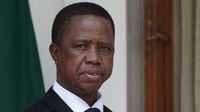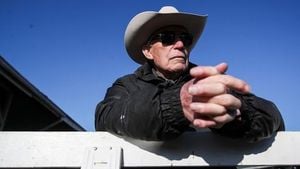Former Zambian President Edgar Lungu passed away on Thursday, June 5, 2025, at the age of 68, his family and political party, the Patriotic Front (PF), confirmed. Lungu died in a Pretoria, South Africa clinic, where he had been under medical supervision in recent weeks. His daughter, Tasila Lungu-Mwansa, announced his death in a heartfelt video posted on the PF's official Facebook page, emphasizing that "his condition was managed with dignity and privacy with support from all well-wishers." Although the exact cause of death was not disclosed, it is known that Lungu had been receiving specialized treatment for an undisclosed illness.
Edgar Chagwa Lungu was Zambia's sixth president, serving from 2015 until 2021. He first assumed office in January 2015 after winning a special presidential election triggered by the death of then-President Michael Sata. Lungu completed Sata's term and was subsequently elected to a full five-year term in 2016, securing just over 50% of the vote. However, in the 2021 election, he was decisively defeated by current President Hakainde Hichilema, losing by nearly a million votes amid widespread dissatisfaction with his administration.
Lungu's presidency was marked by a mix of ambitious development initiatives and significant challenges. He championed efforts to diversify Zambia's economy beyond its heavy reliance on copper, promoting infrastructure development and human security. Notably, he appointed Zambia's first female vice president, Inonge Wina, and introduced progressive policies such as commuting death sentences and establishing a national day of prayer. His tenure also enhanced Zambia's international standing, strengthening diplomatic relations across the region and beyond. As Lungu once said, "We are all ambassadors of our country in our own right. Whether you belong to the ruling party or opposition, you only have one country you can proudly call yours." This message of national unity was echoed by his daughter at the announcement of his passing, invoking the spirit of "One Zambia, One Nation," a creed that guided his service.
Despite these achievements, Lungu's time in office was fraught with economic difficulties. Zambia faced recessionary pressures, rising debt levels, and high unemployment, which critics attributed to his administration's policies. His government was also dogged by corruption scandals involving allies and relatives, allegations that Lungu consistently denied. Political tensions rose as his party's youth wing was accused of harassing opposition supporters and the general population. Moreover, Lungu's government frequently resorted to emergency powers to quell unrest, including during riots fueled by rumors of ritual killings that sparked xenophobic violence.
Human rights organizations and opposition groups criticized Lungu for suppressing dissent, curbing freedoms of expression, assembly, and the press. The rapid enactment of laws like the Cyber Security and Cyber Crimes Act raised fears of stifling online criticism. Several media outlets critical of the government were shut down, and activists faced intimidation and arrests. Lungu defended these heavy-handed tactics, explaining that he invoked a state of emergency "to bring sanity" to turbulent times. At one point, he controversially stated, "I would have to take unprecedented measures, and some people will have to lose their rights. So, if I become a dictator for once, bear with me," a remark that alarmed many observers who feared authoritarianism.
After his 2021 electoral defeat, Lungu initially retired from politics but returned to the frontline in 2023 amid waning popularity of his successor. He declared, "I am ready to fight from the front, not from the rear, in defence of democracy. Those who are ready for this fight, please come along with me, I am ready for anything." However, his comeback was met with significant resistance. In 2024, the Constitutional Court barred him from contesting the next presidential election, ruling that his initial term from 2015 to 2016 counted as a full term, thus reaching the two-term limit stipulated by law. Lungu alleged political interference in this decision.
Following his return to politics, Lungu reported harassment by police, claiming he was "virtually under house arrest." In a May 2024 interview, he recounted being barred from attending an international conference and prevented from traveling abroad for medical treatment. The police even warned him against jogging in public, labeling his weekly workouts as "political activism." The government, however, denied these claims, stating that Lungu had "never been placed under house arrest" and was free to exercise his rights. Police explained that monitoring former presidents was standard procedure for their safety.
Born on November 11, 1956, in Ndola, Zambia, Lungu graduated with a law degree from the University of Zambia in 1981. He also underwent military training at the Miltez army college in Kabwe. Before entering politics, he worked as a lawyer and held positions at Barclays Bank and Zambia Consolidated Copper Mines. His political career began in 2011 when he won a parliamentary seat as a PF member. He quickly rose through the ranks, serving as deputy minister in the vice-president's office, then minister of home affairs, defense, and justice, before ascending to the presidency.
Lungu was married to Esther Lungu, and together they had six children. Throughout his life, he was described by close friends as a "good foot-soldier, lawyer and politician, father, husband and grandparent." Public opinion on Lungu remains mixed; supporters laud his dedication to Zambia's development and stability, while critics highlight concerns over governance, economic management, and political repression. His main political rival, President Hakainde Hichilema, acknowledged Lungu's role but criticized his leadership style, stating, "Respect and recognition is earned and not forced." Hichilema also called for "solemnity, unity and an outpouring of love and compassion" following Lungu's death, urging Zambians to come together "above political affiliation or personal conviction, to honour the life of a man who once held the highest office in our land."
As Zambia mourns the loss of its former leader, the nation reflects on a complex legacy marked by both progress and controversy. Edgar Lungu's journey from a lawyer and military officer to the presidency encapsulates a pivotal chapter in Zambia's recent history, illustrating the challenges and aspirations of a country striving for unity and development amid political turbulence.





